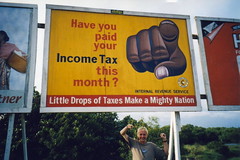
- Image by Walt Jabsco via Flickr
Recently, the city fathers in Philadelphia began bringing local blogs under existing small business ordinances, asserting that money-making blogs are, in fact, small businesses. (In the story linked above, these financial powerhouses made $50/year in one case, $11/year in another.) Federal tax returns shared with the city showed that Philadelphia bloggers were claiming income from blogs generated within city limits, giving someone at city hall the bright idea that a tax revenue opportunity lay in their midst.
It seems a logical argument, and the registration fee of $50/year or $300/lifetime isn’t extravagant. And, unlike some who are calling this a “blogging tax,” the fact is that existing small business licensing and income tax provisions are being applied to blogs that make money. (Note: New York City has a similar tax on small businesses, but it exempts the first $3,400 of tax liability, a smart move.) So, while it’s not a “blogging tax” per se, in practice it is picking out a new class of business for taxation.
Correcting the misconception that Philadelphia has levied a “blog tax” has preoccupied many, including the Guardian, which states:
But there is no blog tax. Philadelphia levies a licence fee on small businesses, which is no more a tax on bloggers than the UK’s VAT is a tax on chocolate buttons.
But chocolate buttons aren’t as complicated as blogs. Two problems arise when laws written for traditional small businesses are applied to blogs:
- Most blogs — even those that try to make money — don’t make enough to cover the relatively small ($50/year) business fee Philadelphia wants to impose
- Most blogs are exercises of freedom of speech, while most small businesses are not
By combining the chilling effect of taxes that might exceed incomes, thus forcing some blogs to cease operations, combined with the type of conduct blogs inherently engage in — namely, expression of ideas — the big question will come down to issues about freedom of speech.
Earlier this year, a Texas tax law designed to make it more difficult to operate strip clubs was struck down when exotic dancing was found by an appeals court to be protected by the First Amendment:
While nude dancing ‘falls only within the outer ambit of the First Amendment’s protection,’ it is nevertheless protected as expressive conduct.
If dancing without clothes on is protected from new taxes, can something within the inner ambit of the First Amendment be protected from taxation policy that could purposely or accidentally eliminate free speech?
Of course, newspapers and other publications have to pay taxes, but they are usually larger entities and not run by individuals. Again, this is why a carve-out for very small businesses makes sense.
I’ll bet this goes to court, and when it does, Philadelphia will have a hard time defending its practice as it exists. People within city limits who sell on eBay or who sell corn from their gardens each summer probably aren’t forced to register or pay annual registration fees — either because the city doesn’t go after them, or they don’t report the modest income on their taxes.
And registration is another vulnerability here. By forcing bloggers to register with the city, a perceived intrusion by the government could be argued. In fact, a political blogger in Missouri suggested that one Congressional candidate might like the idea of the registration and taxation scheme. It seems he’s trying to silence two bloggers in his area by filing complaints with the Federal Election Commission. So, clearly, the notion of using tax policy and registration requirements to chill free speech is occurring to people in the political realm.
Blog software is free. Blogging is free speech. Well, except in Philadelphia at the moment, where any blog with a small widget of Google ads or an infrequently trafficked Amazon storefront might find itself forced to consider whether $11/year and the urge to blog is worth another $39 in local small business fees.
Free speech indeed.
Discussion
4 Thoughts on "Taxes Clash with Free Speech in the Philadelphia Blogosphere"
If I read the story correctly, it seems the city of Philadelphia wants to tax businesses in it’s jurisdiction. The bloggers, by accepting advertisements which generate revenue, are holding themselves out as businesses. So there’s a simple solution – don’t host advertising.
The second issue of chilling free speech, is to this point, a red herring. The city is only asking for the business to register, and if there is no business, there is no registration required. No advertising revenue, no registration. If a political jurisdiction ever does require registration for the privilege of blogging, I think we have a much more serious issue.
I agree if the exception is for all businesses and I see no reason for it not to be.



